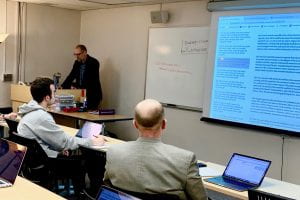Professor Robert K. Nelson from the University of Richmond Visits JMU
During the Spring 2019 semester, JMU’s Networked Humanities, a campus-wide initiative sponsored by the College of Arts & Letters, welcomed Robert K. Nelson to campus.
A leading digital humanist and Director of the Digital Scholarship Lab at the University of Richmond, Professor Nelson has earned national recognition for collaborative projects that use digital methods to explore the past in innovative and illuminating ways.
One of his lab’s projects, for example, used a technique known as “topic modeling” to analyze more than 112,000 pieces (consisting of nearly 24 million words) from the Richmond Daily Dispatch during the years of the Civil War. (Read more about the project on the Digital Scholarship Lab website.)
 Image: “Mining the Dispatch” by Robert K. Nelson (2010). Detail of one news text of the collection and its topics pie chart.
Image: “Mining the Dispatch” by Robert K. Nelson (2010). Detail of one news text of the collection and its topics pie chart.
Another influential project used mapping and visualization techniques to study the denial of financial services to inner-city neighborhoods through redlining during the New Deal.
During his visit to JMU, Professor Nelson discussed these and other projects in two public events: a workshop on topic modeling and text classification techniques and a talk on “The Rewards of Openness,” which explored the value of open sharing of evidence and data within the digital humanities. Specifically, Professor Nelson explored the project Redlining Richmond, a fascinating study of a map and surveys produced during the 1930s that enabled the Home Owners’ Loan Corporation to zone neighborhoods in Richmond for “residential security.” Throughout the talk Professor Nelson showed how the Redlining Richmond project reveals the centrality of race during the politics of the time, and how racial tensions were coded into maps and political discourse.
Professor Nelson’s visit was a great success. Faculty from ten disciplines attended the workshop, and graduate students, undergraduates, staff and faculty from throughout the College of Arts & Letters attended Professor Nelson’s excellent talk and joined in the lively conversation that followed.
